Willy Ruiz had a stroke while he was giving a presentation on iPhones, iPads and iPods.
"I left with my boots on," he jokes. Mr Ruiz had been Apple's marketing manager in Spain for 10 years, but his life changed on that morning in 2013.
"Everything was going very fast, and it stopped. Then everything started to go very slowly," he says.
He woke up from a coma to a world that was now hostile territory, and where he had to get used to having a brain he no longer controlled. "The first night I slept at home after the stroke, I fell out of bed," he recalls.
But the greatest challenge was in navigating the outside world. One night, Mr Ruiz was returning home after eating with some friends at a Madrid restaurant when he needed to use a restroom.
On a street full of bars, he was unable to find one with wheelchair access. When he finally did, there were three stairs to the restroom. He thought: "Why isn't there an app for me to know where I can go to the bathroom?"
That's when he had the idea for Mapcesible, a mobile app that works as a sort of TripAdvisor for people with reduced mobility.
Users rate places, from restaurants to beaches, by their accessibility. They respond to a questionnaire designed by Ilunion, the foundation of the Spanish Blindness Organisation (Organisacion Nacional de Ciegos Espanoles, or Once), and can even upload pictures.
Another Spanish body, Fundacion Telefonica, has given technical and financial support. "The first tests were done by the foundation's volunteers, and we added to the information by incorporating data from dozens of public databases, such as those of municipalities," says the group's institutional relations director Luis Rojo.
SPAIN'S LEGAL APPROACH
In 2003, Spain passed the Equal Opportunities, Non-Discrimination and Universal Accessibility for People with Disabilities law, which requires "buildings, areas, tools, equipment and technology, and goods and products" to be inclusive. The law also requires "the removal of access barriers and adaptation of equipment and tools".
In 2011, Spain's main disability agencies worked with the Federation of Municipalities and Provinces to produce the largest report to date on mobility, analysing 70 towns and cities.
The study showed, for example, that 90 per cent of municipalities had public staircases that did not comply with regulations and 67.6 per cent of traffic lights did not have a warning device.
"A growing number of technological tools aim to help with mobility, but an app doesn't make a place accessible if the physical barriers are still there," says Mr Jesus Hernandez, director of universal accessibility and innovation at the Once foundation, adding that they are working to update the study's data.
In 2016, Catalan company Mass Factory launched a tool that guides disabled people through the public transport network, and Google Maps has integrated an option to show access-friendly places.
"Every bit counts, but a building without an elevator is still a prison for a disabled person," Mr Hernandez says. •

